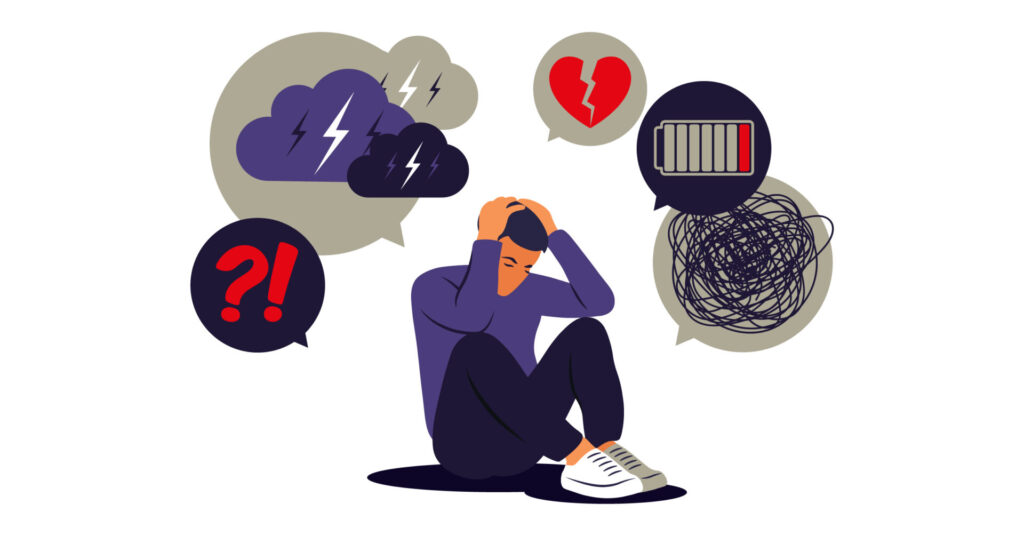Imagine leaving for work and you encounter a lion in the middle of the street. Your options are to either turn around and run, get into an armed fight with the lion or you get so scared that you can’t move. This is an example of the effects of stress on the body.
Biologically, this whole process is stress and stress response. Although there is a lot of literature in the academic body on effects of stress on the body, psychologists are yet to come to a consensus on how to properly define stress. Different studies use different parameters for the definition of stress but the biological implications remain the same.
Effects of Stress on the Body: What and Why
Encountering a lion and feeling stressed physiologically makes sense, but why does our body react the same way when we’re about to go on stage, and confess our love to someone, before an important exam? These are just some examples of the effects of stress on the body.
Evolutionarily, stress is necessary for adaptation. In ancient times, predators, and lack of food and shelter were the main reasons for the effects of stress on the body. However, in today’s time, although predatory stress is no longer a factor, anything that can be debilitating to our physical and emotional well-being, is bound to bring a stress response.
Behind Stress
Hans Selye, who is popularly known as the father of stress research, defined stress as anything that knocks us out of our normal equilibrium. Our body wishes to retain normality and goes into a tug of war called adaptation, to put it more simply, adjusting to the new normal. He distinguished stress as being Eustress and Distress.
Eustress, essentially pleasant stress, is the feeling of excitement and elation that life situations bring. It also explains why a lot of us enjoy roller coasters and waterslides.
Distress is what brings panic, avoidance, flight or fight, etc. Sometimes, we create our own stressors. Effects of stress on the body can be felt before an exam, or confessing our love for our partner and other such instances, we tend to think about the possible negative outcomes apprehensively causing distress.
But what happens in the body when you stress? In the short term, effects of stress on the body, caused by somatosensory information from the environment, is conveyed to the brain by the functions of the afferent nerves through the spinal cord. This information enters the Hypothalamus-Pituitary-Adrenocortical axis (HPA).
Here, the HPA processes this information causing the release of glucocorticoids. Glucocorticoids such as cortisol increase glucose in the bloodstream to increase muscular output required for the fight or flight response.
The Sympathetic Adrenomedullary System which is a part of Sympathetic Nervous System releases epinephrine and norepinephrine which play a major role in the changes that a person experiences when they go in the fight or flight mode.
These effects of stress on the body lead to changes including rapid heart rate, reduced blood flow to the organs required for digestion and other processes, increased blood flow to the limbs and the brain, etc.
Harmful Effects of Stress on the Body
While this response is important on the evolutionary front, constantly putting the body through this state can be extremely harmful. From an evolutionary perspective, theories suggest that stress is extremely energy consuming, which leaves no energy left for other activities, especially reproductive activities which are crucial for survival. Secondly, the changes that may be advantageous in front of threats may cause tissue damage. Hence, it is required that stress, especially chronic stress be addressed immediately.
Increasing stress interacts with genetic predisposition to certain illnesses determining which disease a person might acquire. Direct physiological changes are seen in the form of elevated blood pressure, higher cholesterol levels, and decreased immune functioning. Studies of immune functioning have found that chronic stress affects secretion of cytokines, suppressing immunity and increasing risk for allergic reactions and infections.
The catecholamines may affect lipid levels which lead to development of atherosclerosis – hardening of the arteries. Excessive cortisol levels in the body can lead to destruction of the neurons of the hippocampus causing deficits in verbal functioning, memory and concentration.
Stress and Weight Gain
Obesity, which in itself causes a host of physical issues, is also related to stress. Increased activation of the HPA leads to storage of fat in the belly area, rather than in the hip areas. This happens because digestive functioning comes to a standstill in times of extreme stress, and since stress is very energy consuming, any food that is consumed gets stored in the body in the form of fat, in case an event (stress response) occurs where the body requires more energy.
This leads to accumulation of fat in the belly areas and overall increase in weight leading to higher numbers on the Body Mass Index Scale and hip-to-waist ratio. It also indirectly slows down metabolism considerably leading to a host of other problems such as Polycystic Ovarian Syndrome (PCOS). Among others, stress is one of the leading risk factors for developing hypertension, coronary heart disease and Type 2 diabetes.
Effects of stress on the body, like chronic stress, are also related to adopting poor health behaviours. These behaviours include poor sleep quality, poor nutrition, and less exercise. People even engage in stress relieving behaviours such as smoking, alcohol abuse and drug abuse which have potentially harmful effects in the long term. Stress is also related to poor dietary habits.
People suffering from chronic stress tend to skip breakfasts, snack more, and eat more unhealthy fried foods than fruits and vegetables. Job stress and financial constraints also affect eating habits. While social support is advocated to deal with stress, people with chronic stress tend to avoid social interaction and isolate themselves, making it worse.
Numerous reasons may cause chronic stress from poor work environments, financial crisis, anxiety disorders, relationship issues, gender identity issues, chronic diseases, etc. Although causes are endless, taking proper measures to manage stress can be a great step towards preventing major health issues.

Constant thoughts running through your mind causing you stress?
If that stress affect your daily moods as well
How to Manage Stress
Ways to manage the effects of stress on the body include getting adequate social support, therapy, exercise, etc. Commonly, spending quality time with friends can considerably reduce stress. Spending time with friends involves sharing stressful issues, joking about things and getting emotional validation and support which helps in dealing with stress. Therapy which focuses on emotional regulation, challenging negative cognitions is seen to be effective in dealing with stressors. Cognitive Behavioural Therapy is one of the most commonly used treatment methods for anxiety and related disorders.
Exercise is also associated with increase in Sympathetic arousal but not HPA activation, which can actually be good for blood circulation and release of endorphins which have a protective effect on health. Meditation and mindfulness have equally beneficial effects on the mind and body.
A huge chunk of the world’s disease burden has stress as one of the contributing factors which makes it even more important to understand the effects of stress and take precautionary measures to prevent it.
Do you feel you suffer from stress? Or do you think you might be stressed, and want to know more? Reach out to an Ananda counsellor today. Book a free session to seek help.
Read More:
The Psychology of Sleep: The Stages, Sleep Paralysis and Sleep Disorders
Mental Health Effects of Screen Time: Impact of Excessive Screen Time on Mental Health







